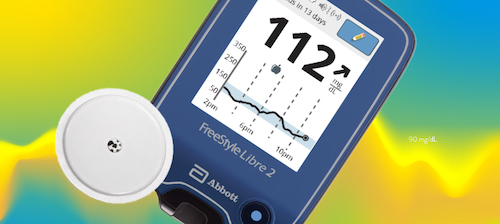
September 21, 2022 – Abbott today announced new data from the Real World Evidence of FreeStyle Libre (RELIEF) study showing the use of FreeStyle Libre, a continuous glucose monitoring system (CGM) significantly reduced the rate of hospitalizations due to acute diabetes events (ADEs) for people living with Type 2 diabetes on once-daily (basal) insulin therapy.1 These findings were published in the Journal of Diabetes Technology & Therapeutics and presented at the 58th Annual European Association for the Study of Diabetes (EASD) meeting.
The retrospective study of the French national health claims database shows that the 5,933 people with Type 2 diabetes who were following a basal-only regimen and using the FreeStyle Libre system had 67% fewer ADE-related hospitalizations one year after initiating the FreeStyle Libre treatment. The data also show a 75% reduction in hospitalizations for diabetic ketoacidosis (DKA), a potentially life-threatening condition when glucose levels are too high for too long and ketone levels rise to dangerous levels in the blood, and a 44% reduction in admissions for severe hypoglycemia (low glucose levels). Further, the study showed sustained reductions in hospitalizations over a two-year period of FreeStyle Libre system use, regardless of whether the patients were under the care of a diabetes specialist or a general healthcare practitioner.
When oral medications are no longer sufficient to regulate glucose levels, a doctor might change diabetes treatment, starting with once-a-day (basal) insulin therapy. However, studies show that people with Type 2 diabetes who start basal insulin therapy are three times more likely to experience severe hypoglycemia.
The fear of hypoglycemia affects both people with Type 2 diabetes and their doctors. This fear is a barrier to intensifying treatment and impacts a patient’s willingness to follow the basal insulin therapy as prescribed by their doctor. The RELIEF study suggests that reducing the incidence of hypoglycemia and DKA may improve adherence and help people with diabetes achieve their glycemic targets. This is especially relevant for older people, where hypoglycemia is associated with a significantly increased risk of falls, fractures, dementia, and death.
The results from this latest study add to a growing body of evidence that has shown the effectiveness of the FreeStyle Libre system in reducing hospitalizations in people with Type 1 and Type 2 diabetes on multiple daily injections of insulin.9 Currently, in most European countries, the FreeStyle Libre system is reimbursed for all people with Type 1 diabetes. People with Type 2 diabetes can only get the product reimbursed if they meet certain criteria, such as using insulin several times a day or having poorly controlled glucose levels.
